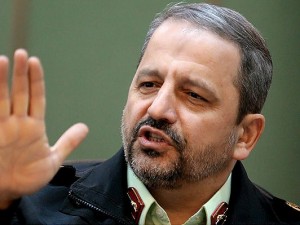Iranian Judiciary Seeks China Model of State Censorship for Facebook
Police Warn Rouhani Cabinet Members Against Facebook Use
In a direct warning to cabinet officials in the Rouhani administration who openly use Facebook and other social media sites that are officially forbidden to the Iranian citizenry, Iran’s Police Commander Esmaeel Ahmadi Moghaddam criticized “certain government officials” today, telling a group of reporters that “It’s not a good thing that certain government officials are attempting to slowly pass the red lines and enter an environment the utilization of which is prohibited for other citizens…It’s obvious that when accessing a site is prohibited, accessing it through other means could also have legal and judicial consequences.”
The warning reflects the continuing debate among high ranking Iranian officials over access to Facebook and other social media sites. The dispute, ongoing for weeks now, pits the cabinet of Hassan Rouhani against the conservative Judiciary, Police and other officials. Iran’s foreign minister Javad Zarif, continues to use Facebook as an important tool to inform Iranians of Iran’s foreign policy developments, and other cabinet members such as the Minister of Culture and Islamic Guidance, Ali Jannati, have openly said that they use Facebook and see nothing wrong with public access to it.
The debate took a new turn this week with the conservatives’ statement that they would grant the Iranian nation access to the popular social networking site if Facebook agreed to cooperate with Iran’s state censors. In a televised press conference, Hamid Shahriari, Head of the Judiciary’s Center for Statistics and Information Technology, announced that, “we do not oppose Facebook per se; we oppose corruption. We oppose organization of information against the country’s national security. These are issues which we oppose.” Hamid Shahriari then made a statement never expressed publicly before: “Naturally, if those networks agree to consider our reservations, just as they did in countries such as China, where [these companies] considered their reservations, we can offer free access to this network, so everyone can use it.”
Hamid Shahriari holds a purely administrative position within the Judiciary and is not the organization’s spokesperson. However, the statement is significant because he is the first Iranian official to openly ask Facebook or any other social media website to submit to government censorship in return for the Iranian public’s access to the networks. He did not provide further details clarifying the Islamic Republic’s “reservations” or what social networks would have to do in order to convince the Iranian officials that they could begin providing “free access” to their citizens.
During his regular press conference today, Iran’s Prosecutor General and Spokesperson for the Judiciary Gholamhossein Mohseni Ejehi confirmed Shahriari’s statements. He told the reporters, “So long as Facebook allows manifestations of crimes such as prostitution and immoral behavior, its use is not appropriate.” When a reporter asked him about the discrepancy between the viewpoints of the Police and the Judiciary, he said, “There is no conflict between the Police force and the Judiciary about this subject. Facebook and other social networks have criminal applications as observed by the related Work Group and qualified authorities who have taken action in this regard [banning access to Facebook]. The Facebook environment allows anti-security activities and provides education on immoral, prostitution, and inappropriate content, and so long as these illegal activities remain on it, this trend will continue. But if those responsible for these networks eliminate the criminal issues, other decisions will be made.”
And so, as the Iranian nation watches, the debate continues.







